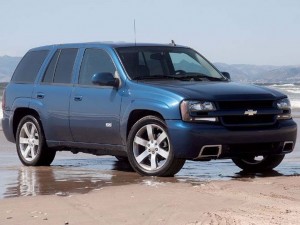
GM is re-recalling a number of 2006 - 2007 midsize SUVs, such as this Chevrolet TrailBlazer, due to a potential fire hazard.
General Motors is recalling almost 190,000 older SUVs for the third time to try to fix problem switches that could cause a vehicle fire.
The problem is so severe that the maker is warning owners to park the vehicles outside until repairs can be made – but it doesn’t expect to have the necessary parts until at least October.
The problem centers around switch window switch modules in the driver’s door that may short out if exposed to rain or other liquids. It’s a problem a number of other manufacturers have experienced over the last several years, and has proven particularly difficult to resolve, Honda also having to re-recall some models after an initial fix proved ineffective.
The latest GM recall covers 189,000 SUVs sold in North America in 2006 and 2007, including the Chevrolet TrailBlazer, GMC Envoy, Buick Rainier, Isuzu Ascender and Saab 9-7X.
The problem is yet another blow for General Motors, however, as it sorts through an ongoing series of safety issues that have led it to order a record 60 recalls since the beginning of the year covering 29 million vehicles. That includes 2.6 million linked to an ignition switch problem now blamed for at least 13 deaths, and for which the maker has now set up an open-ended victims’ compensation fund.
But GM isn’t alone. Overall, the auto industry has recalled more than 40 million vehicles in the U.S. since January 1, blowing past the previous record of 31 million set in 2004. The surge, industry observers suggest, has been the result of greater media coverage and tighter government scrutiny. GM already paid $35 million in fines levied by the National Highway Traffic Safety Administration for delays in the ignition switch recall, and Hyundai this week was slapped with a $17.35 million fine for delaying a recall for faulty brakes.
(Ford investigating fire that destroyed prototype F-Series pickup during testing. Click Here for more.)
Complicating matters, manufacturers have been stung by major problems with key components, including both window switches and airbags. Defective airbag inflators supplied by troubled Japanese parts maker Takata have forced the recall of more than 10 million vehicles by a Who’s-Who of manufacturers ranging from Toyota to BMW.
The switch issue is another broad problem affecting a wide range of manufacturers, including GM, Toyota and Honda. The switches were not properly sealed from the elements and, if they come into contact with rain or other liquids can rust and then short out. This can cause overheating and possibly a fire.
The problem has been known about for some time. One owner reported the issue to NHTSA in October 2008, complaining that she heard her car alarm go off and by the time she looked out the window saw her 2006 Chevrolet Trailblazer go up in flames in her driveway.
“The fire burned the entire driver’s side of the vehicle, a portion of the front passenger seat and the roof,” she wrote, adding that firefighters indicated the blaze had started in the driver’s door.
(Feds subpoena records from GM finance unit. Click Here to find out why.)
GM initially limited its response to the reports, ordering a so-called “service campaign” focused on 20 cold weather states, as well as Washington, D.C. In August 2012, it turned that into an official recall.
But the issue proved to be more serious than initially thought and, with NHTSA and GM receiving a combined total of 242 complaints, including 28 reports of fires, it expanded the scope of the recall in 2013, noted the Associated Press.
(GM ready to wrestle for midsize truck leadership. Click Here for the story.)
The maker initially tried to seal the circuit board linked to the problem. But it continued to receive complaints and decided on re-recalling vehicles because, “the fix that we put in did not work,” according to spokesman Alan Adler. It now plans to replace the switches entirely – once it can get a supply of replacement parts in place, something that is expected to take several months.
Until then, owners are advised that because the vehicles could catch fire unexpectedly, they should be park outside and away from any buildings.
Honda, which tried a similar fix to seal off faulty switch modules, also had to re-recall about 143,000 vehicles a year ago to make more extensive repairs.
